Guess who? Val McDermid, Ian Rankin, Sophie Hannah and other crime writers reveal their favourite detectives | Crime fiction
John Banville
I first saw the literary possibilities of the “crime novel” when I was in my middle teens, and my older brother gave me a copy of Raymond Chandler’s The Big Sleep. Until then I had mostly known the jigsaw puzzles of Agatha Christie or the barely bearable Wimseycalities of Dorothy L Sayers. Here, in Chandler, was style.
Philip Marlowe is, of course, his creator’s dream version of himself: tough, but tender too, wised up but not cynical, a private eye who has read a book, and likes nothing better of a rainy California evening than to light a pipe and replay a few demonstration games by one of the great chess masters.
Though the novels display an unfortunate weakness for outlandish metaphors – the tarantula on the angel cake, that kind of thing – they can be subtle and witty, and even, on occasion, wise. The women, too, are attractive – tender and tough, like Phil himself – even though in every one of the novels the real murderer turns out to be female.
Yes, down those mean streets a literary original must go. And in the case histories of crime fiction, Marlowe is the original original.
Ian Rankin
I was a fairly late convert to crime fiction as a reader, and one of the first characters I remember falling for in a big way was Lawrence Block’s Matt Scudder. Scudder is a private eye who is an ex-cop. He’s conflicted, driven and an alcoholic. His beat is contemporary New York and his friends include a brutal yet gracious villain called Mick Ballou. I’d say that the gangland boss Cafferty in my novels owes a large debt to Ballou and (especially in his early outings) my hero John Rebus shares DNA with Scudder.
The novels are all great, but my favourites include When the Sacred Ginmill Closes and A Walk Among the Tombstones. They are the perfect hardboiled mix of grit and poetry: cool jazz with surface noise.
Natalie Haynes
I have too many favourite literary detectives to pick one, so I’m going for Jessica Fletcher of the long-running US TV series Murder, She Wrote. A fully rounded character from her first outing, when she solves the murder of a man dressed as Sherlock Holmes, JB Fletcher is my model of what it means to be a successful author: famous enough to be invited to everything, read by almost all policemen, present at the scene of multiple crimes yet suspected of none. Jessica solves murders from Cabot Cove to New York, with the occasional foray to London and Ireland, and once doubles up with Tom Selleck in a crossover episode with Magnum, PI. I couldn’t love her more.
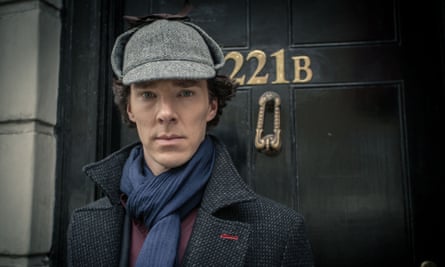
Saima Mir
Growing up, I prided myself on being able to solve the crimes before getting to the end of the book. I read the entire Nancy Drew series, the Hardy Boys, but, even at a young age, my favourite was always Sherlock Holmes.
In secondary school, a teacher mentioned that the deduction techniques detailed in Sir Arthur Conan Doyle’s work had been so well crafted that they influenced the policing of the day. That fiction could change the world was a powerful idea, and one I wanted to be part of.
Back then, I thought the Holmes books were great yarns, full of intrigue and dapper people living in splendid surroundings, solving cases that verged on the supernatural but always ended with a logical conclusion. Today, as a crime writer, I see that the genius behind Conan Doyle’s work was characterisation. Holmes is the ultimate flawed protagonist, and that’s what makes him so fascinating. He’s obsessive, logical and extremely intelligent, but also socially inept. His powers of deduction are his defining trait, but he’s also a junkie. He’s not a hero, but he’s our hero.
Mark Billingham
The Maltese Falcon by Dashiell Hammett is widely regarded as the novel that kickstarted the American hardboiled movement, and its protagonist, Sam Spade, is certainly the archetypal hardboiled private eye. That said, he is no Chandlerian knight errant, and it is Spade himself who provides the novel’s most enduring mystery. Pragmatist or chancer? Detached and taciturn or cold and calculating? To put it simply, are his motives honourable or not?
Dorothy Parker “mooned” over Spade for days after reading the novel, though later on she would be even more lovestruck by Philip Marlowe (fickle, that Algonquin mob). Spade appeared in only one novel and, while it is interesting to speculate whether Hammett would have brought him back in further stories had he continued to write, I like to believe that he would have resisted the temptation. We should be grateful that we were never given the chance to get inside the head of his most famous and compelling character.
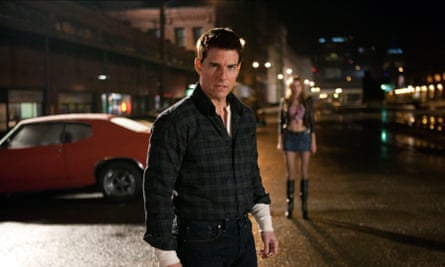
Dreda Say Mitchell
Of all the detectives that crowd crime fiction, few have succeeded as completely as Lee Child’s Jack Reacher. There have been many attempts to explain Jack’s popularity. Is his persona rooted in Greek myth, or is he a reinvention of the frontier cowboy? There’s probably a simpler explanation. In an ambiguous, cynical and morally uncertain world, Jack is unashamedly with the good guy against the bad guy, whatever the odds, and especially when the bad guy is rich and powerful. Jack’s on your side, and readers love him for it.
Ann Cleeves
I’ve enjoyed the recent crime fiction coming from Australia: books by Jane Harper, Chris Hammer and Hayley Scrivenor. My favourite of their detectives is Hammer’s Nell Buchanan. She first appears in Opal Country as an inexperienced young investigator supporting homicide detective Ivan Lucic in the remote mining badlands. She comes into her own in Dead Man’s Creek, a richly textured novel in which events of the past play out in the present in the place where Nell grew up.
She’s resilient, strong and complex, distant from her family because of her choice of career and her mother’s obsessive anxiety. In the end, her family becomes the focus of the investigation, and Nell understands her relatives and herself with a new clarity. Both her past and the beautifully described landscape define her. I hope she returns in future books.
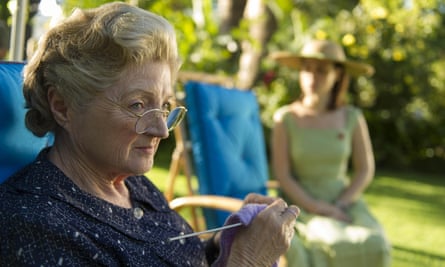
Kate Mosse
It has to be Miss Marple. On a rainy summer holiday in Devon in the 1970s, when I was 13 or 14, I found a novel on the shelf of our rented cottage. Everything smelled of paraffin heater and damp, it was too wet to go out and I had read all the books I’d brought with me. It was an old Fontana paperback, blue and green, with just the author’s name in block capitals and the title: The Body in the Library. Curled up on a window seat, I read it in one sitting.
The novel is set in a small village in England, with a clever, unique, uncompromising older woman sleuth. It was my first Christie, my first Miss Marple, and the first novel I ever discovered for myself. Best of all was looking at the front of the book and discovering that Agatha Christie had written one or two other novels.
It was the beginning of my lifelong love affair with Miss Marple. She is one of the great unsung heroines of literature: principled, resolute, courageous, a rare older woman in fiction who is there on her own terms, rather than as someone’s mother or grandmother. She first appeared in a short story published in 1927, The Tuesday Night Club, and 12 full-length novels followed, including the brilliant Sleeping Murder – published posthumously, but written during the second world war and kept in a vault.
Jane Marple is shrewd and modest, with a twinkle in her eye, and although often overlooked by the official men of law around her, she always gets her man (or woman). A trailblazer.
Alyssa Cole
My favourite fictional detective is Charlotte Holmes of Sherry Thomas’s Lady Sherlock series, which reimagines Sherlock Holmes as merely a cover story for a brilliant young woman who has boldly escaped the strictures of aristocratic life. To support herself in her newfound freedom, she uses her keen intellect, unmatched powers of observation and out-of-the-box thinking to solve crimes, with the ruse of an ailing and never-seen brother named Sherlock as a front for her business.
The series is delightfully witty, deftly juggling interesting mysteries, family matters and societal issues facing women then and now, and there’s a slow-burn childhood-friends-to-lovers romance to boot. If you’re a Sherlock fan, you’ll surely enjoy this clever iteration of the famous sleuth.
Val McDermid
Josephine Tey’s Inspector Alan Grant was one of the first police detectives to appear in British crime fiction. Scotland Yard’s man at the centre of The Daughter of Time – voted the best crime novel of all time by the Crime Writers’ Association – bucked the trend when it came to fictional policemen. He was intelligent, cultivated, ironic and empathic. He never bullied witnesses or suspects. His interviewing style was sometimes based more on intuition than evidence, but always rooted in observation.
At a time when ideas about gender and sexuality were firmly entrenched, Tey gave us subtle hints that Grant was different. Here is Tey describing a potential love interest through Grant’s eyes: “She was more like an adolescent boy than a prospective dowager. She was wearing very elegant trousers and a disreputable old lumber jacket and he remarked … that she was one of the few women who looked really well in trousers.” But what proves far more seductive is his previous encounter with a dead man on the Caledonian sleeper with “tumbled black hair and … reckless eyebrows”. I love Alan Grant because he’s so far from straightforward: he can signify whatever we need him to.
Stella Duffy
I was probably about eight when I first picked up my older sister’s secondhand Trixie Belden book. It was a hard-cover, much-read copy of Trixie Belden and the Mystery of the Emeralds. In it, Trixie dives into a mystery, supported by half a dozen other young teenagers, a group of friends and siblings. She leads the gang into and out of trouble and, along the way, learns about the American civil war and the Underground Railroad.
For the next few years I read every Trixie Belden book I could find. She didn’t hand over leadership to the boys like Enid Blyton’s girls in the Secret Seven and Famous Five; she wasn’t wealthy or pretty like Nancy Drew. Her girlfriends were easily as important as the boys in the gang, and she was almost always fierce and brave, confronting what she saw as injustice. She was a glorious antidote to the largely pathetic girl roles I saw around me in the early 1970s and, I’m now sure, the queer role model I didn’t yet know I needed.
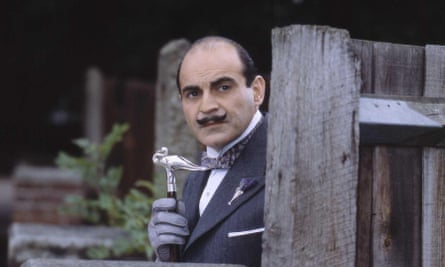
Sophie Hannah
I love the way Agatha Christie’s Hercule Poirot combines brilliant intellectual deduction and a deep understanding of the dark side of human nature with a strong desire to make life as jolly as possible. He appreciates the finer things: his sirops, his wonderful moustaches, well-tailored clothes, beautiful things and places. I can also strongly relate to his obsessively tidy streak and his desire to matchmake in the romantic arena. He is excellent at persuading people that the person they’re madly in love with is a moral vacuum, and to consider the much nicer and more reliable alternative romantic prospect instead. Last but not least, I love his showmanship: gathering all the suspects together and delivering an amazing performance as he shares the solution to the mystery.
Jean Kwok –
I have loved Tana French’s Cassie Maddox from the moment I met her, as seen through the eyes of her partner, the narrator of In the Woods: “Barely medium height, with a cap of dark curls and a boyish, slim, square-shouldered build … There was something about her: maybe the way she stood, weight on one hip, straight and easy as a gymnast; maybe just the mystery.”
I was delighted to hear Cassie speak for herself as the narrator of The Likeness, which takes place after the dramatic events of In the Woods. In this suspenseful thriller, she goes undercover to pose as a murder victim who looked exactly like her.
Fearless and honest, Cassie is as tough as any classic hardboiled detective, yet remains insightful and kind without veering into sentimentality. When there’s a standoff at gunpoint, she wants the antagonist to keep the gun pointed at her because she knows there are innocents in the room. Her hand on her own weapon never wavers. And yet, afterwards, she feels grief and guilt. She is strong not despite her emotional vulnerability, but because of it.
Sara Paretsky
Whenever I’m stuck for a title to a work-in-progress, my brain automatically tosses up VI Warshawski and the Baseball Team From Mars – a riff on one of the books in my favourite series, the adventures of Freddy the Pig.
Walter R Brooks, who created Mister Ed, the talking horse, wrote 26 books about Freddy and the other animals on the Bean family farm. Humans own the farm, but the animals help with both farmwork and housework. Imagine fluffy bunnies as dustcloths.
In the third book in the series, Freddy the Detective, Freddy models himself on Sherlock Holmes. Mrs Wiggins, one of the cows, is his Watson, but all the animals help – they shadow human bank thieves, they stop the rats from stealing Mr Bean’s grain, and they find out who took the Bean children’s toy train.
As a self-taught detective, Freddy makes some ludicrous missteps, but it’s part of his charm that he can laugh at himself. In the book’s climactic scene, a trial in the barn with the rooster as judge, Freddy gets the cat off a murder rap with some impressive deductions, and crucial evidence that the mice help gather.
Some of the books reach deeper into fantasy and sci-fi than I like, including Freddy and the Baseball Team From Mars. However, as a child, I loved Freddy and Mrs Wiggins in a way that I never loved Nancy Drew: her life is so perfect that I couldn’t see myself in her. As a chubby child who was ridiculed in the playground, I found a pig detective a perfect companion.
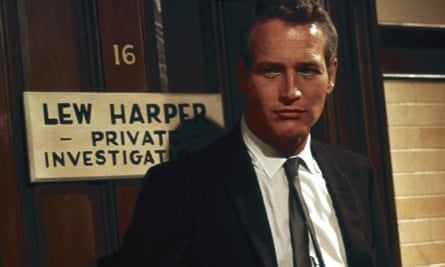
David Baldacci
Lew Archer was the brainchild of Ross Macdonald (the nom de plume of Kenneth Millar). Archer was a private eye who walked the mean streets of Los Angeles for decades, and saw an unwieldy evolution of humanity with every stride. He could not have existed without Sam Spade and Philip Marlowe before him. Spade had the callous unpredictability, Marlowe the snarky wit; Archer brought to the table a heart and a soul, and a way of making sense of the world that was deeply, viscerally connected to the reader.
A private detective is keenly positioned to observe humankind in the most dire circumstances – no one needs a PI when times are good. Millar was never unduly preachy: he was too smart for that. He allowed his PI to observe, interact, help, fight, swear off, drink up, and, ultimately, capitulate to the demands of merely being human in an inhumane world. We feel every blow he takes, we smile at every crackling witticism, and we sense the emotional pain of a man in a fragile world, as the tightly packed story sails through uncharted waters.
No one who came before did it better. Nor has anyone done it better since.
John Banville
I first saw the literary possibilities of the “crime novel” when I was in my middle teens, and my older brother gave me a copy of Raymond Chandler’s The Big Sleep. Until then I had mostly known the jigsaw puzzles of Agatha Christie or the barely bearable Wimseycalities of Dorothy L Sayers. Here, in Chandler, was style.
Philip Marlowe is, of course, his creator’s dream version of himself: tough, but tender too, wised up but not cynical, a private eye who has read a book, and likes nothing better of a rainy California evening than to light a pipe and replay a few demonstration games by one of the great chess masters.
Though the novels display an unfortunate weakness for outlandish metaphors – the tarantula on the angel cake, that kind of thing – they can be subtle and witty, and even, on occasion, wise. The women, too, are attractive – tender and tough, like Phil himself – even though in every one of the novels the real murderer turns out to be female.
Yes, down those mean streets a literary original must go. And in the case histories of crime fiction, Marlowe is the original original.

Ian Rankin
I was a fairly late convert to crime fiction as a reader, and one of the first characters I remember falling for in a big way was Lawrence Block’s Matt Scudder. Scudder is a private eye who is an ex-cop. He’s conflicted, driven and an alcoholic. His beat is contemporary New York and his friends include a brutal yet gracious villain called Mick Ballou. I’d say that the gangland boss Cafferty in my novels owes a large debt to Ballou and (especially in his early outings) my hero John Rebus shares DNA with Scudder.
The novels are all great, but my favourites include When the Sacred Ginmill Closes and A Walk Among the Tombstones. They are the perfect hardboiled mix of grit and poetry: cool jazz with surface noise.
Natalie Haynes
I have too many favourite literary detectives to pick one, so I’m going for Jessica Fletcher of the long-running US TV series Murder, She Wrote. A fully rounded character from her first outing, when she solves the murder of a man dressed as Sherlock Holmes, JB Fletcher is my model of what it means to be a successful author: famous enough to be invited to everything, read by almost all policemen, present at the scene of multiple crimes yet suspected of none. Jessica solves murders from Cabot Cove to New York, with the occasional foray to London and Ireland, and once doubles up with Tom Selleck in a crossover episode with Magnum, PI. I couldn’t love her more.

Saima Mir
Growing up, I prided myself on being able to solve the crimes before getting to the end of the book. I read the entire Nancy Drew series, the Hardy Boys, but, even at a young age, my favourite was always Sherlock Holmes.
In secondary school, a teacher mentioned that the deduction techniques detailed in Sir Arthur Conan Doyle’s work had been so well crafted that they influenced the policing of the day. That fiction could change the world was a powerful idea, and one I wanted to be part of.
Back then, I thought the Holmes books were great yarns, full of intrigue and dapper people living in splendid surroundings, solving cases that verged on the supernatural but always ended with a logical conclusion. Today, as a crime writer, I see that the genius behind Conan Doyle’s work was characterisation. Holmes is the ultimate flawed protagonist, and that’s what makes him so fascinating. He’s obsessive, logical and extremely intelligent, but also socially inept. His powers of deduction are his defining trait, but he’s also a junkie. He’s not a hero, but he’s our hero.
Mark Billingham
The Maltese Falcon by Dashiell Hammett is widely regarded as the novel that kickstarted the American hardboiled movement, and its protagonist, Sam Spade, is certainly the archetypal hardboiled private eye. That said, he is no Chandlerian knight errant, and it is Spade himself who provides the novel’s most enduring mystery. Pragmatist or chancer? Detached and taciturn or cold and calculating? To put it simply, are his motives honourable or not?
Dorothy Parker “mooned” over Spade for days after reading the novel, though later on she would be even more lovestruck by Philip Marlowe (fickle, that Algonquin mob). Spade appeared in only one novel and, while it is interesting to speculate whether Hammett would have brought him back in further stories had he continued to write, I like to believe that he would have resisted the temptation. We should be grateful that we were never given the chance to get inside the head of his most famous and compelling character.

Dreda Say Mitchell
Of all the detectives that crowd crime fiction, few have succeeded as completely as Lee Child’s Jack Reacher. There have been many attempts to explain Jack’s popularity. Is his persona rooted in Greek myth, or is he a reinvention of the frontier cowboy? There’s probably a simpler explanation. In an ambiguous, cynical and morally uncertain world, Jack is unashamedly with the good guy against the bad guy, whatever the odds, and especially when the bad guy is rich and powerful. Jack’s on your side, and readers love him for it.
Ann Cleeves
I’ve enjoyed the recent crime fiction coming from Australia: books by Jane Harper, Chris Hammer and Hayley Scrivenor. My favourite of their detectives is Hammer’s Nell Buchanan. She first appears in Opal Country as an inexperienced young investigator supporting homicide detective Ivan Lucic in the remote mining badlands. She comes into her own in Dead Man’s Creek, a richly textured novel in which events of the past play out in the present in the place where Nell grew up.
She’s resilient, strong and complex, distant from her family because of her choice of career and her mother’s obsessive anxiety. In the end, her family becomes the focus of the investigation, and Nell understands her relatives and herself with a new clarity. Both her past and the beautifully described landscape define her. I hope she returns in future books.

Kate Mosse
It has to be Miss Marple. On a rainy summer holiday in Devon in the 1970s, when I was 13 or 14, I found a novel on the shelf of our rented cottage. Everything smelled of paraffin heater and damp, it was too wet to go out and I had read all the books I’d brought with me. It was an old Fontana paperback, blue and green, with just the author’s name in block capitals and the title: The Body in the Library. Curled up on a window seat, I read it in one sitting.
The novel is set in a small village in England, with a clever, unique, uncompromising older woman sleuth. It was my first Christie, my first Miss Marple, and the first novel I ever discovered for myself. Best of all was looking at the front of the book and discovering that Agatha Christie had written one or two other novels.
It was the beginning of my lifelong love affair with Miss Marple. She is one of the great unsung heroines of literature: principled, resolute, courageous, a rare older woman in fiction who is there on her own terms, rather than as someone’s mother or grandmother. She first appeared in a short story published in 1927, The Tuesday Night Club, and 12 full-length novels followed, including the brilliant Sleeping Murder – published posthumously, but written during the second world war and kept in a vault.
Jane Marple is shrewd and modest, with a twinkle in her eye, and although often overlooked by the official men of law around her, she always gets her man (or woman). A trailblazer.
Alyssa Cole
My favourite fictional detective is Charlotte Holmes of Sherry Thomas’s Lady Sherlock series, which reimagines Sherlock Holmes as merely a cover story for a brilliant young woman who has boldly escaped the strictures of aristocratic life. To support herself in her newfound freedom, she uses her keen intellect, unmatched powers of observation and out-of-the-box thinking to solve crimes, with the ruse of an ailing and never-seen brother named Sherlock as a front for her business.
The series is delightfully witty, deftly juggling interesting mysteries, family matters and societal issues facing women then and now, and there’s a slow-burn childhood-friends-to-lovers romance to boot. If you’re a Sherlock fan, you’ll surely enjoy this clever iteration of the famous sleuth.
Val McDermid
Josephine Tey’s Inspector Alan Grant was one of the first police detectives to appear in British crime fiction. Scotland Yard’s man at the centre of The Daughter of Time – voted the best crime novel of all time by the Crime Writers’ Association – bucked the trend when it came to fictional policemen. He was intelligent, cultivated, ironic and empathic. He never bullied witnesses or suspects. His interviewing style was sometimes based more on intuition than evidence, but always rooted in observation.
At a time when ideas about gender and sexuality were firmly entrenched, Tey gave us subtle hints that Grant was different. Here is Tey describing a potential love interest through Grant’s eyes: “She was more like an adolescent boy than a prospective dowager. She was wearing very elegant trousers and a disreputable old lumber jacket and he remarked … that she was one of the few women who looked really well in trousers.” But what proves far more seductive is his previous encounter with a dead man on the Caledonian sleeper with “tumbled black hair and … reckless eyebrows”. I love Alan Grant because he’s so far from straightforward: he can signify whatever we need him to.
Stella Duffy
I was probably about eight when I first picked up my older sister’s secondhand Trixie Belden book. It was a hard-cover, much-read copy of Trixie Belden and the Mystery of the Emeralds. In it, Trixie dives into a mystery, supported by half a dozen other young teenagers, a group of friends and siblings. She leads the gang into and out of trouble and, along the way, learns about the American civil war and the Underground Railroad.
For the next few years I read every Trixie Belden book I could find. She didn’t hand over leadership to the boys like Enid Blyton’s girls in the Secret Seven and Famous Five; she wasn’t wealthy or pretty like Nancy Drew. Her girlfriends were easily as important as the boys in the gang, and she was almost always fierce and brave, confronting what she saw as injustice. She was a glorious antidote to the largely pathetic girl roles I saw around me in the early 1970s and, I’m now sure, the queer role model I didn’t yet know I needed.

Sophie Hannah
I love the way Agatha Christie’s Hercule Poirot combines brilliant intellectual deduction and a deep understanding of the dark side of human nature with a strong desire to make life as jolly as possible. He appreciates the finer things: his sirops, his wonderful moustaches, well-tailored clothes, beautiful things and places. I can also strongly relate to his obsessively tidy streak and his desire to matchmake in the romantic arena. He is excellent at persuading people that the person they’re madly in love with is a moral vacuum, and to consider the much nicer and more reliable alternative romantic prospect instead. Last but not least, I love his showmanship: gathering all the suspects together and delivering an amazing performance as he shares the solution to the mystery.
Jean Kwok –
I have loved Tana French’s Cassie Maddox from the moment I met her, as seen through the eyes of her partner, the narrator of In the Woods: “Barely medium height, with a cap of dark curls and a boyish, slim, square-shouldered build … There was something about her: maybe the way she stood, weight on one hip, straight and easy as a gymnast; maybe just the mystery.”
I was delighted to hear Cassie speak for herself as the narrator of The Likeness, which takes place after the dramatic events of In the Woods. In this suspenseful thriller, she goes undercover to pose as a murder victim who looked exactly like her.
Fearless and honest, Cassie is as tough as any classic hardboiled detective, yet remains insightful and kind without veering into sentimentality. When there’s a standoff at gunpoint, she wants the antagonist to keep the gun pointed at her because she knows there are innocents in the room. Her hand on her own weapon never wavers. And yet, afterwards, she feels grief and guilt. She is strong not despite her emotional vulnerability, but because of it.
Sara Paretsky
Whenever I’m stuck for a title to a work-in-progress, my brain automatically tosses up VI Warshawski and the Baseball Team From Mars – a riff on one of the books in my favourite series, the adventures of Freddy the Pig.
Walter R Brooks, who created Mister Ed, the talking horse, wrote 26 books about Freddy and the other animals on the Bean family farm. Humans own the farm, but the animals help with both farmwork and housework. Imagine fluffy bunnies as dustcloths.
In the third book in the series, Freddy the Detective, Freddy models himself on Sherlock Holmes. Mrs Wiggins, one of the cows, is his Watson, but all the animals help – they shadow human bank thieves, they stop the rats from stealing Mr Bean’s grain, and they find out who took the Bean children’s toy train.
As a self-taught detective, Freddy makes some ludicrous missteps, but it’s part of his charm that he can laugh at himself. In the book’s climactic scene, a trial in the barn with the rooster as judge, Freddy gets the cat off a murder rap with some impressive deductions, and crucial evidence that the mice help gather.
Some of the books reach deeper into fantasy and sci-fi than I like, including Freddy and the Baseball Team From Mars. However, as a child, I loved Freddy and Mrs Wiggins in a way that I never loved Nancy Drew: her life is so perfect that I couldn’t see myself in her. As a chubby child who was ridiculed in the playground, I found a pig detective a perfect companion.

David Baldacci
Lew Archer was the brainchild of Ross Macdonald (the nom de plume of Kenneth Millar). Archer was a private eye who walked the mean streets of Los Angeles for decades, and saw an unwieldy evolution of humanity with every stride. He could not have existed without Sam Spade and Philip Marlowe before him. Spade had the callous unpredictability, Marlowe the snarky wit; Archer brought to the table a heart and a soul, and a way of making sense of the world that was deeply, viscerally connected to the reader.
A private detective is keenly positioned to observe humankind in the most dire circumstances – no one needs a PI when times are good. Millar was never unduly preachy: he was too smart for that. He allowed his PI to observe, interact, help, fight, swear off, drink up, and, ultimately, capitulate to the demands of merely being human in an inhumane world. We feel every blow he takes, we smile at every crackling witticism, and we sense the emotional pain of a man in a fragile world, as the tightly packed story sails through uncharted waters.
No one who came before did it better. Nor has anyone done it better since.
